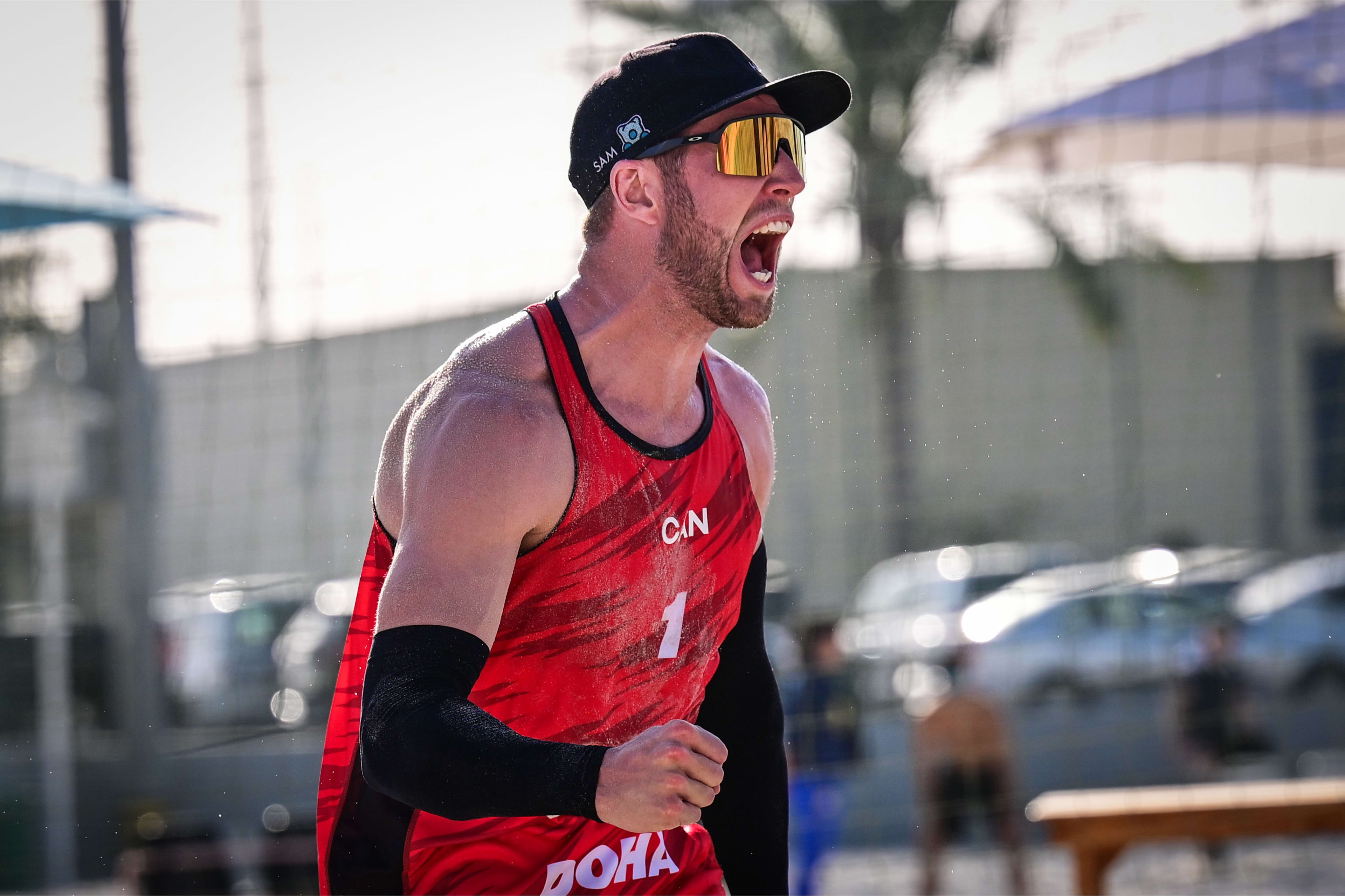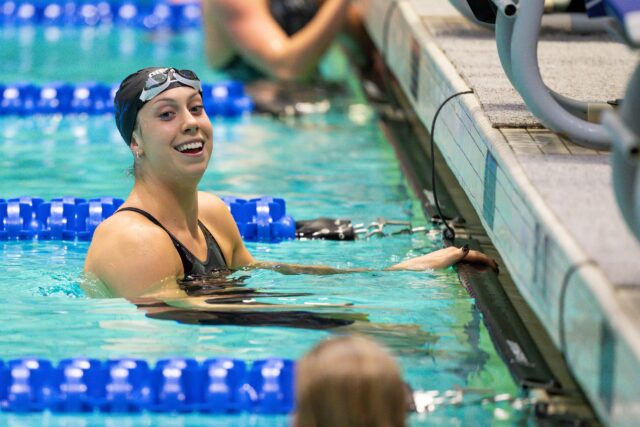HERMOSA BEACH, California — It only took 36 matches over the course of 12 tournaments, on a schedule that took them across three continents, for Sam Schachter and Dan Dearing to finally land it:
Their Big Win.
The one that announced that they had arrived. The one they’d been waiting for since March’s 2023 season-opener in La Paz, Mexico.
It wasn’t that they hadn’t had their chances over the course of that 2023 season. There were plenty. Went to three with Austria’s top pair, Mortiz Pristauz and Robin Seidl, in Itapema, Brazil, only to fall two points shy. A few hours later, they did the same with eventual Manhattan Beach Open champs Taylor Crabb and Taylor Sander. Later that summer, in Montreal, they’d push Olympic bronze medalists Cherif Samba and Ahmed Tijan to three, go into extra points in both sets with Brazil’s Pedro and Guto, and extend a second set with Germans and then-world No. 4 Nils Ehlers and Clemens Wickler to 20-22. At the World Championships in October, they’d claim the first set over Renato Lima and Vitor Felipe, only to drop that one, too, in three.
But finally, after a season underscored by a motif of one close call after the next, after knocking on the door of a dozen teams who had established themselves as elite on the Volleyball World Beach Pro Tour, Schachter and Dearing closed out a match. In the Dominican Republic, site of the NORCECA Continental Championships, Schachter and Dearing swept Miles Partain and Andy Benesh, the American duo who had medaled in three Elite16s and twice stunned Anders Mol and Christian Sorum en route to a gold in Gstaad, Switzerland. It was the biggest win of their partnership, the validating moment of which they had been so starved. They were understandably elated.
And then their coach, a Serbian by the name of Srdjan Veckov, “comes straight to the bench with a list of things we did wrong,” Schachter said on SANDCAST: Beach Volleyball with Tri Bourne and Travis Mewhirter, shaking his head and laughing. “We’re like ‘Damn man!’ We respect it. He’s really, really good. He’s changed a lot of our team culture and attitude and work ethic.”
Schachter, a 33-year-old defender, made his debut as a professional in 2011. He’s qualified for an Olympic Games — 2016 with Josh Binstock — won six international medals and once dominated the erstwhile NVL Tour, winning four of the five events he played. He has, in other words, seen a lot.
Prior to Veckov, he can only recall one other coach who matched his work ethic.
“It’s rare to have a coach who outworks you, but that guy works hard, and he’s always watching film, he’s always thinking about practice, he’s always writing stuff down,” Schachter said. “I respect that. I’ve had two coaches in my career who worked way harder than I did. He’s one of those guys. When he speaks, I listen.”
It wasn’t an overhaul Schachter and Dearing needed from Veckov, more a fine-tuning, someone who could help them flip the 13-15 three-set losses into 15-13 wins. Such are the thin margins between the Canadian pair ranked No. 27 in the world and, say, the No. 10 Qatari duo they nearly upset in Montreal. They know it. Veckov knows it. It’s why he’ll find the room for improvement even after the most momentous of victories, like that semifinal win over Benesh and Partain last December.
“That final five percent of your development is absolutely the hardest,” Schachter said. “Think about school: You can get to 90 percent. But to get to 95, 100, you have to lock in to get those percentage points. It’s the same thing in volleyball. Everyone is so close. It’s that crazy amount of work. You look at the matches that are decided by a tiny margin, so when you’re doing conditioning, you’re doing all that conditioning for that one point. When you’re doing all these random situations, it’s for that one point that you need. Everyone can do things pretty equally.”

The question being asked of Schachter, Dearing, and Veckov: Is there enough time to add those extra percentage points to their game? They consistently found themselves on the wrong end of that microscopic margin in 2023, losing eight of 10 matches that went the full three sets. They currently stand No. 26 in the Olympic rankings, needing to jump seven or so spots to punch their ticket to the Paris Games without having to go through the Continental Cup, where they would likely have to beat Cuba’s Noslen Diaz and Jorge Alayo, a formidable duo who swept Schachter and Dearing in the Continental Championships.
The answer to that will remain a matter of time. It’s also something that remains mostly out of their control. While they cannot control the way a ball will bounce on a random Tuesday in Doha, for instance, they can control the effort they put into practice, the amount of film they watch, the reps they put in throughout the off- and pre-season. They can control for the fact that, during a recent California training camp, Dearing didn’t want anything to do with the final conditioning workout of the week — but “I knew I was going to do it anyway,” he said, even if it did result in him hurling into the sand afterwards.
“That’s the thing with Sam and I: Yeah, conditioning sucks, but we’re doing it with somebody,” Dearing said. “It’s a feeling of being together. It’s all your mind. It’s all your mind. Going 87 percent is unacceptable. I don’t want to do this, but I’m going to do this.”
Although it is never useful to wonder such things, Dearing occasionally does find himself wondering: What could have been had they been partnered for longer? Had Veckov been on staff from the start?
“If Sam and I were a partnership the last six or seven years and we had Veckov as a part of our team, we could have done a lot of damage,” Dearing said. “Looking back, we’d feel unstoppable.”
Yet such is the current reality in which they live: “We’re trying to squeeze it all in,” he said, “last minute.”
They’ve only had one match in 2024, a single qualifying bout with Tri Bourne and Chaim Schalk in last week’s Doha Elite16. They fell in three (18-21, 21-15, 10-15), though, like any close loss at the Elite16 level, there were positives to take away. Dearing was, by most measures, the best player on the court. His 60 percent side out led all four players, and his two blocks per set is a world class standard to hit. But such is the challenge facing every team on the cusp of qualifying or not: The window of time is becoming increasingly compressed, with only nine events remaining in the Olympic qualification cycle.
“Every day is hard. Every day is tough. And then you go out there and you go ‘I’ve done the work. I’ve done the work.’ It’s a battle,” Dearing said. “Beating Andy and Miles gave us some confidence. Those guys beat Norway twice, and we just beat a team that beat the No. 1 team in the world. Boom, earned a stripe. Now we’ve raised the standard that we can’t let one little point, one little pass, one little serve — that’s the difference between beating those teams and losing to those teams.”
The qualifying loss in Doha is tough to swallow though far from devastating. Dearing and Schachter will begin the next two Challenges, in Recife and Saquarema, Brazil, in the main draw, and will likely be straight into the main draw in Guadalajara, Mexico. They’ll have another crack at an Elite16 qualifier in Tepic. It is still possible for them to make a run. They know the training they’ve put in, and they know they have an obsessive coach in their box who won’t let the smallest of mistakes slide.
“Bees are always going to find honey, and flies are always going to find,” Schachter said, trailing off and laughing, “not honey. These thin margins, it’s so mental, and it’s such a belief thing.”

Sam Schachter, Dan Dearing, and the new culture of Canada’s top beach team Volleyballmag.com.















You must be logged in to post a comment Login